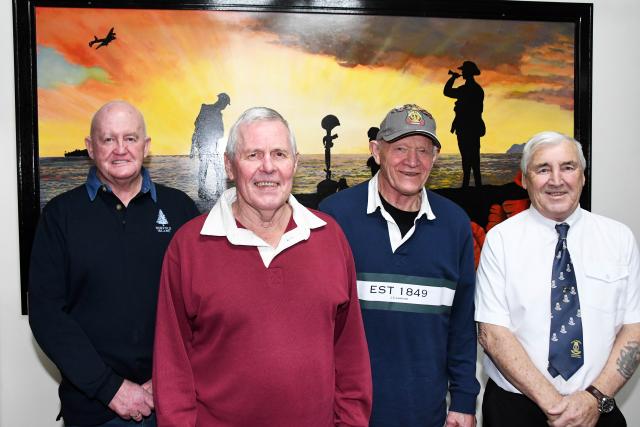
By Eleanor Wilson
It has been over 50 years since Pakenham RSL member Frank Grant was conscripted to fight in the Vietnam War, but he still clearly remembers unsealing the determinative envelope bearing his name.
It was the late 1960s, war efforts in Vietnam were peaking, and a young Frank and 12 of his close friends would meet each night when their conscription letters began coming out.
Frank was the last of the group to receive his letter, and the only to be conscripted.
“They were all whooping when they got their letter saying they weren’t conscripted,” he said.
It was a similar experience for Gary Elliott, who was undertaking his apprenticeship as a mechanic when he was drafted.
“Being conscripted, we had a choice – you went to the army or you went to jail. It was pretty simple,” he said.
So too for Henry Van Diemen, who carries a lasting memory of the war in his left eye – a piece of shrapnel sustained from a hand grenade injury while he was serving in the 4th battalion of the Royal Australian Regiment.
Then there’s William Beattie – a navy man who was tasked with transporting troops from Sydney to Vietnam and back on the HMAS Sydney (III) – a voyage he took seven times.
Unlike his fellow Vietnam vets, William joined the navy voluntarily, serving for nine years.
The men all played different roles in the war.
Frank was a pastry cook and worked in catering in the first Australian Reinforcement Unit (1ARU), before he was transferred to the 5th battalion (5RAR).
Gary spent most of his time working in Vung Tau at the 102 Field Workshops, occasionally completing jobs with American forces in Nui Dat and Quy Nohn.
Henry operated machine guns in the infantry for 173 days before his injury saw him medevaced back to Australia in September 1968.
William would spend months at a time at sea during his voyages on the HMAS Sydney (III) and HMAS Derwent.
Despite their differences, the four Pakenham RSL members share a unique bond owed to their experiences in Phuoc Tuy province, and the political backlash they received upon their return.
It’s a connection they will take with them to Canberra later this week, as they attend the National Commemorative Service recognising 50 years since the end of Australia’s involvement in the Vietnam War.
Unbeknownst to the group, the trip was made possible by fellow members of the Pakenham RSL, who raised money to send the vets and their partners to the ceremony.
While their medals will sit proudly on their chests come Friday 18 August, they spent many years collecting dust due to the political and social tension born out of the conflict.
“I never wore my [medals] until I started working [with the Vietnam Veterans Association]…they were just sitting in boxes,” Gary said.
“I was still sick of it at that stage. I figured they didn’t want to know about it then, they don’t want to know about it now.”
At the time, anti-war protests were gaining momentum and many Vietnam veterans received a hostile reception to their homecoming from the war.
“By the time we hit the late ’60s, the anti-war crusade had really got going and we weren’t looked on very kindly at all,” Gary said.
All four men said they lost friendships because of their involvement in the war.
“I had some mates that didn’t speak to me once I said I was going, they just cut off all communication,” Frank said.
William recalls having difficulty docking the HMAS Sydney in the early ‘70s due to the unrest.
“They’d throw blood, s**t, piss, everything at us,” he said.
The veterans were also shunned from their local RSLs, with many existing members not considering the conflict as a “real war” due to its classification as a ‘police action’ at the time.
Gary joined the Pakenham RSL upon his return in 1970, but said he was only tolerated “because I’d been working on their cars before I’d entered the army”.
“Not everyone had that opportunity, some of the guys were told to piss off out of the place,” he said.
“Nobody wanted to know you, the subject just changed when you got home. The only people you could talk to were your mates who had served with you.”
The former Pakenham RSL president remembers being cloaked in a thick humidity when he arrived at Tan Son Nhut Air Base near Saigon, three weeks before Christmas in ‘68.
He also recalls a distinct mist that would routinely be discarded from large planes, enveloping troops and the ground below.
“The single common denominator of all of us out of Vietnam – every one of us got agent orange.
“The aircrafts would fly over spraying insecticide straight over the top of the water source, but the agent orange wasn’t emptied out of the tanks, so there’d be 150 to 200 litres of agent orange still in the 5000 litre tank.
“It was coming through our water source and we were distilling it and drinking it,” William added.
“That’s what is getting all of our guys now.”
Throughout the course of Australia’s involvement in the Vietnam War between 1962 and 1973, 60,000 Australians, including ground troops and air force and navy personnel, served.
The war itself claimed the lives of millions, including 523 Australians. An additional 2400 Aussies were wounded.
Vietnam Veterans’ Day is this Friday, 18 August, coinciding with the 57th anniversary of the Battle of Long Tan.






